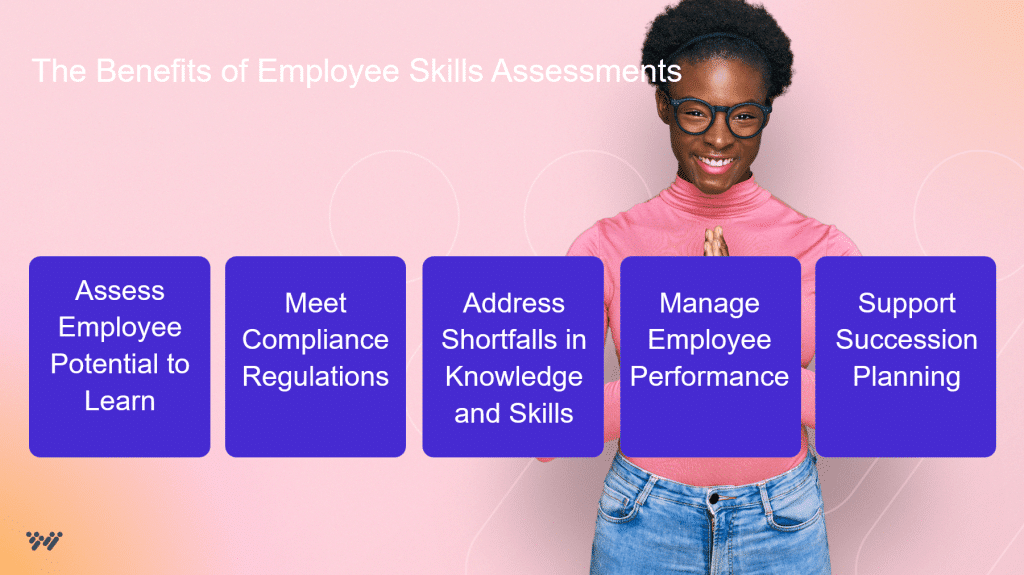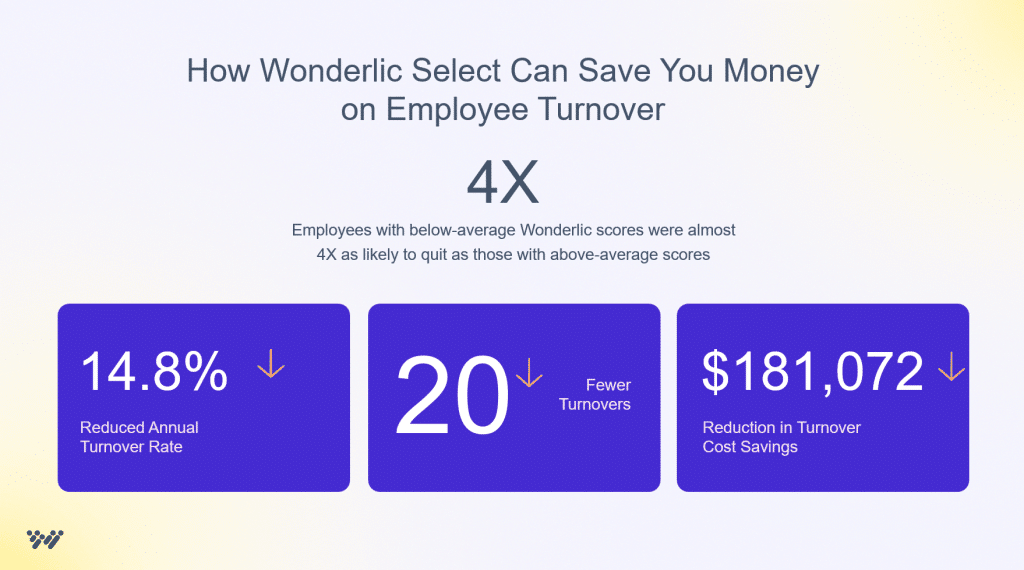Some 14% of new hires either fail to perform or leave within their first six months of employment. Without an effective employee skills assessment, your team risks wasting time, resources, and effort onboarding and integrating new team members who won’t make the cut.
High turnover rates not only affect productivity but also pressure existing staff, requiring them to fill the voids left by departing colleagues. Additionally, high turnover may highlight potential deficiencies in your organization’s recruitment strategies, onboarding, and training processes, underscoring the need for effective hiring practices to select high-potential talent from the initial hiring decision.
In this blog, we cover the importance of — and limitations — of employee skills assessments, including the benefits, processes, and key considerations of the assessments critical for creating and sustaining a productive team.
What Is an Employee Skills Assessment?
A skill is the ability to perform a specific task, combining knowledge with physical or mental effort — such as operating a machine or coding. “Skills” is the term most often associated with candidate and employee assessments; however, effectively assessing workers must go beyond the basic requirements of a job. It must involve measuring multiple components that are essential to success.
That’s because skills assessments are a snapshot in time, as skills are an ever-changing asset with a shrinking half-life. Fixed characteristics such as motivation and personality traits provide a much more accurate and helpful assessment of employee fit than other traits.
Assessing skills is most beneficial in the late stages of the hiring process when deciding between high-quality candidates. While traditional skills assessments offer valuable insights, a comprehensive understanding of an individual’s potential requires broader talent assessments that consider a range of skills competencies and contextual factors, such as multi-measure talent assessments.
Why Organizations Measure and Assess Employees’ Skills
Just 23% of employees today feel engaged at work. Evaluating people skills can improve job satisfaction by hiring people who are qualified and prepared for a job, building a positive workplace culture that boosts teamwork and innovation, ultimately, increasing employee engagement.
On the flip side, failing to measure and assess employees’ skills can harm your organization. Without a clear understanding of a candidate’s capabilities, your company may struggle to align talent with the right jobs, leading to inefficient resource allocation and diminished productivity.
Secondly, without measuring skills systematically, a company may become less potent and competitive. This could make adapting to changing industry needs more difficult and potentially limit long-term success.
Types of Skills Assessments
Skills assessments come in many forms, including
- Technical/traditional skills assessment. Technical or traditional skills assessments evaluate employees’ proficiency in specific technical skills relevant to their role, such as software proficiency, coding abilities, or specific knowledge.
- Communication skills test. These tests measure how well someone speaks and writes, including expressing information clearly, interacting with colleagues, and communicating effectively with clients or customers.
- Cognitive assessment: Cognitive assessments provide valuable insights into a candidate’s or employee’s cognitive skills, such as problem-solving, critical thinking, memory, and logical reasoning. These also predict learning speed (learnability) and can help teams tailor onboarding programs to match each individual’s learning pace, ensuring a more effective and personalized training experience.
- Personality assessment. Find out how well employees work within a team, including their ability to collaborate, contribute to group projects, and communicate effectively with team members. Testing employees’ adaptability to change, flexibility in handling different tasks, and ability to thrive can uncover valuable information about their interpersonal skills, work style, and resilience.
- Cultural fit test. Assess how well employees align with the organization’s values, culture, and work environment to ensure a positive fit within a team.
- Power skills/multi-measure talent assessments. Multi-measure employee skills assessments like Wonderlic assess several factors of candidates and employees, including personality, cognitive ability, and motivation, giving a three-dimensional view of talent that’s highly predictive of on-the-job performance. In addition, these assessments measure soft skills, or power skills, such as interpersonal skills, emotional intelligence, and conflict resolution abilities that contribute to effective workplace performance and relationships.
Limitations of Traditional Skills Assessments
Time-intensive and cost-prohibitive
Recruiting for a new role often means sifting through hundreds or thousands of applications. Using traditional skills assessments to screen hundreds of applicants is simply too costly and time-consuming to be practical or feasible. For example, a bookkeeping assessment costs around $20/person. With hundreds or thousands of applicants, that could cost the organization thousands of dollars.
One-dimensional view
Traditional skills assessments also don’t paint the full picture of candidates. Take an accountant as an example. While candidates for this role should have the foundational skills necessary for the job, filtering out applicants based solely on QuickBooks skills during the initial screening of hundreds of applications at the top of the funnel may not be the most effective (or budget-conscious) approach, especially if dozens of candidates have similar levels of proficiency. For example, paying for an employee to take a QuickBooks certification can cost $1,000, but passing this certification is not the most essential element for succeeding in a role — other factors, like cognitive ability, personality, and motivation, measured against the fixed traits of a role offer much higher levels of predictive power.
In addition, filtering out candidates solely based on their current level of proficiency without factoring in learnability may inadvertently exclude qualified individuals with high degrees of potential and learnability who can quickly develop crucial skills necessary for the job.
— Michael Grossenbacher, Wonderlic Principal Psychometrician
“One of the biggest issues that occurs around assessments is when companies use one for a specific use case and then leverage it inappropriately for another use. Success starts with matching the tool to its purpose.”
Limited predictive power
In addition, traditional skills assessments commonly occur in controlled environments, especially when using simulated scenarios, so they might fall short of fully replicating real-world work situations. This limitation could affect the precision of evaluating an individual’s ability to apply skills effectively in practical, on-the-job settings. For example, a skills assessment in a simulated manufacturing setting where employees are assessed on operating a specific machine — while the evaluation may measure basic technical proficiency, it might not account for the different types of machinery or unexpected interpersonal issues on the factory floor.
At Wonderlic, we advocate for multi-measure talent assessments like Wonderlic Select. With a multi-measure assessment, you and your team can gain comprehensive insights into personality, motivation, and cognitive abilities. Wonderlic provides a single score for candidates that’s tailored to the unique role you’re hiring for so you can make smarter hiring decisions.
Wonderlic is also the only provider in the market that offers off-the-shelf job-scoring profiles that cover all existing and emerging jobs. Armed with these insights, you and your team get the most accurate information for the role you’re hiring for without spending weeks or months building customized job profiles or guessing which features are most important.
The Importance of Employee Skills Assessments in the Talent Lifecycle
Incorporating multi-measure talent assessments into human resources (HR) practices is crucial. These assessments span different stages of the employee lifecycle, from pre-employment to continuous employee training, and they provide a holistic approach to talent management.
Skills Assessments for Recruiting
Getting the pre-hire process right is crucial as it sets the foundation for a successful employee journey. A well-executed pre-hire process saves time and resources by avoiding mismatches between employees and jobs — and the subsequent need for replacements.
Candidate skills assessments allow you to gain far greater visibility into potential and fit, helping you make data-driven hiring decisions. This comprehensive understanding of employee skills can pinpoint individuals whose competencies and qualifications closely match your needs and objectives.
Skills Assessments for Onboarding
During the onboarding phase, assessing candidates helps you create personalized employee development plans. In the hospitality industry, for instance, a hotel can assess the communication, problem-solving, and time-management skills of new hires. This personalized approach facilitates the seamless integration of each employee into specific roles, such as front desk, concierge, or housekeeping, and helps managers create plan for improvement throughout an employee’s tenure.
Skills Assessments for Professional Development
As you progress through the employee lifecycle, skills assessments stay crucial for continuous professional development. By identifying evolving training needs and unlocking employees’ self-awareness skills, employee development assessment tools empower individuals to understand their strengths and areas for improvement, backed with scientific data. This promotes a culture of ongoing improvement, allowing employees to actively shape their professional growth and help your organization achieve success.
The Benefits of Employee Skills Assessments

1. Assess Employee Potential to Learn
Qualifications and skills are great, but employees open to learning new skills are assets to your business.
Why?
Because individuals who are good at learning can easily adjust to new technologies and industry trends (like generative AI). They’re also likely to welcome new and creative ideas and actively solve problems in innovative ways.
Take a customer service setting, for example. A team member may have solid qualifications and skills. However, they also actively seek opportunities to learn new techniques for handling customer inquiries.
This employee not only adapts quickly to updated customer service software but also shows an openness to learning about emerging trends in customer preferences and communication channels.
2. Meet Compliance Regulations
In specific industries, such as healthcare and aviation, assessing and documenting employee skills is required for compliance with industry regulations and legal standards. Skill assessments ensure that employees are equipped to meet these regulatory requirements.
For instance, employee skills assessments can help you comply with anti-discrimination laws and diversity regulations. Assessments can verify that employees have received and understood the training, promoting a workplace free from discrimination and in alignment with current legislation.
3. Address Shortfalls in Knowledge and Skills
Assessing employees can help you identify skill gaps in your workforce and design targeted training and development programs. You can gauge employees’ current skill levels and create personalized training pathways that enhance capabilities and address improvement areas.
Here’s an example:
A software company has recently developed a training program to increase skills in a specific programming language. The training is mandatory for all developers, regardless of their current proficiency in that language.
However, as all employees are required to attend the training, some already well-versed in the targeted programming language find it redundant and a misuse of their time. On the flip side, newcomers may find it challenging to match the pace of advanced content, leading to feelings of overwhelm and frustration.
This lack of understanding of employee skill levels and the indiscriminate application of a training program leads to inefficiency, wasted resources, and a negative impact on employee morale.
Plus, this one-size-fits-all approach can create a sense of disengagement and hinder overall productivity. This highlights the importance of aligning training initiatives with the team’s actual skills and knowledge gaps.
4. Manage Employee Performance
While 72% of employers prioritize supporting their employees’ career development, only a third (32%) feel their performance management program aligns with this goal. Effectively managing talent and performance becomes crucial when you and your teams strive to accomplish more with limited resources.
Why is this important?
- Because employee skills assessments empower managers to set clear expectations and enhance transparency through easily accessible data
- With teams focused on doing more with fewer resources, finding ways to maximize talent and manage performance becomes crucial
5. Support Succession Planning
A multi-measure employee skills assessment offers a deep understanding of individuals’ unique capabilities and strengths. This allows you to pinpoint employees who exhibit essential attributes for leadership, such as effective communication, problem-solving, and personality. These assessments also give executives, and those being prepared for executive roles, broader self-awareness into areas for improvement.
Secondly, tools like a multi-measure skills assessment can help you actively train and develop individuals identified for leadership roles. These employees can improve their leadership skills with focused training, mentorship, and exposure to leadership tasks. This proactive approach ensures a smooth leadership transition when needed, creating a group of well-prepared individuals capable of leading your organization successfully.
Thirdly, by evaluating employees’ leadership potential, you can foster continuous improvement and engagement. This approach not only identifies future leaders but also communicates that employees’ skills and leadership potential are acknowledged and valued. This recognition boosts motivation, transparency, and engagement, creating a sense of purpose and investment in professional growth. These assessments can and should become a vital piece of your leadership programs, helping you build a pool of individuals prepared for key roles.
The Importance of Reskilling
According to the World Economic Forum’s Future of Jobs Report, half of all employees will need reskilling by 2025.
As technology, AI, and automation advance worldwide, employers and workers must stay current with new skills. Since jobs are constantly changing, focusing on hard and technical skills, such as data analysis or programming proficiency, may use up valuable resources unnecessarily. To remain competitive, it’s crucial to measure stable traits like adaptability and resilience for a more complete assessment of an individual’s workplace readiness.
“When you can find something that gives you better hires and saves money at the same time in this economy, it’s a big win.”
Jeff McDonald, Director of HR at Sweetwater Sound
Best Practices for Performing Employee Skills Assessment
Hiring managers spend around 35 hours per week on hiring activities. Following these best practices for candidate skills assessments can ensure efficient and effective talent evaluation, saving valuable time and resources.
Involve employees in the process
Effective managers with strong team relationships can lead their teams to higher organizational performance. However, performance management programs typically place the burden on managers to create, plan, and monitor progress. If managers lack the time or resources to do this across their team, their employees may feel like their career development isn’t valued.
With self-led employee skills assessments, employees can take development into their own hands. Solutions like Wonderlic Develop give employees insights into their strengths and weaknesses relative to their role, showing them exactly what to focus on and which skills are most important for their role. This helps employees improve performance at scale and saves them from potentially awkward conversations about their weaknesses.
Clearly define objectives
If you’ve ever completed a task without knowing what it was for, you’ll appreciate the significance of setting clear objectives.
Defining the goals and objectives of a skills assessment is crucial for both you and your employees. It helps articulate the skills and competencies under evaluation. This clarity ensures that the assessment aligns with broader organizational needs, meets employees’ aspirations, and yields valuable insights.
Choose the right assessment methods
Using a generic, one-size-fits-all skills assessment to evaluate workers can lead to inaccurate measurement of skills. As a result, employees might be rated poorly or excel in areas irrelevant to their actual job roles. This misalignment can lead to frustration among employees, as their true capabilities are not recognized.
Depending on the skills being evaluated, the most appropriate assessment method may include a combination of online tools, self-assessment, manager evaluations, peer reviews, and skill-specific tests.
A diverse set of assessment tools, including multi-measure talent assessments, provide a more comprehensive view of an employee’s capabilities.
Carry out regular and consistent assessments
Regular assessments help track skill development over time and provide a continuous feedback loop for employees and managers.
These assessments are like checkpoints. They help you know what is going well and where your team members can improve. This information provides insights that allow you to take proactive steps to address shortfalls and celebrate employee successes.
Wonderlic offers a robust framework for making sure employee skills are assessed periodically.
Link assessments to employee development plans
Connect skills assessment results to personalized development plans. Once areas for improvement are identified, work with employees to create actionable plans for skill enhancement.
This integration ensures that assessments are meaningful and contribute directly to individual and organizational growth — more on this next.
How to Use Multi-Measure Skills Assessments
The employee skill assessment process is designed to evaluate different aspects of an individual’s capabilities throughout their employee journey.
Let’s look at how to use employee skills assessments throughout the employee lifecycle.
Step 1: Pre-hire Assessments
Top pre-employment assessments leverage advanced industrial-organizational (IO) psychology methodology, providing recruiters with an impartial and thorough understanding of candidates. These insights go beyond what can be obtained from resumes or candidate interviews.
By evaluating cognitive abilities, personality, and motivation, organizations get a holistic view of whether candidates have the necessary skills, how they’ll perform, and whether they’re genuinely interested in the job.
“Wonderlic provided us with an objective tool that supports the HR office in candidate selection. And now, our supervising staff can focus on curriculum and student achievement instead of documenting a misfit employee.”
— Donna Elsner, HR Manager at The Tecumseh Public School

Step 2: Onboarding
Customized assessments based on the specific requirements of the role ensure that new hires have the skills necessary to perform their job responsibilities effectively.
Assess individual capabilities and ensure a smooth integration into the organization with:
Wonderlic is the only provider in the market offering ready-made job-scoring profiles that include all positions. These insights provide the exact information for the specific role you’re hiring for without investing time and energy in constructing customized job profiles or making decisions based on a hunch!
Step 3: Continuous learning & development
As we’ve explained, skill gap analysis identifies gaps between existing skills and those needed for current or future roles. Continuous learning environments encourage a mindset of curiosity and exploration. Teams become more innovative, bringing fresh ideas and creative solutions to the table.
With Wonderlic Develop, your employees can quickly and easily gain job-specific insights into their strengths and weaknesses. Team members can discover practical tips and tools that can be seamlessly integrated into their daily tasks, enhancing their knowledge, skills, and confidence.
How to Use Assessment Results to Improve Performance
What do you do with that information once you have the data and insights to improve cognitive abilities, personality, and motivation?
First, utilizing assessment results to enhance performance involves a strategic and collaborative approach. Identify specific strengths and areas for improvement highlighted by the assessments and communicate these findings transparently with employees, encouraging a constructive dialogue. For example, if an employee excels in time management but struggles with project management, the assessment results provide a roadmap for personalized development.
Next, develop tailored performance improvement plans that capitalize on strengths and address weaknesses. Review and reassess performance metrics regularly to gauge progress and adjust strategies as needed.
By turning assessment insights into actionable steps, you and your team can create a culture of continuous improvement, nurturing individual and collective success.
How Wonderlic Helps Hire and Develop Employees
Wonderlic Select provides a single score that includes a candidate’s power skills, motivations, and personality traits, giving recruiters and hiring managers job-specific insights into a candidate’s fit for a role.
Wonderlic Develop offers scalable, self-led employee development, taking the burden of performance management off managers and giving employees ownership over their careers.
By assessing employees with multi-measure tests, you and your team can gain a holistic view of candidates and employees — where you’ll always have the most accurate picture of candidate fit and role-readiness.






